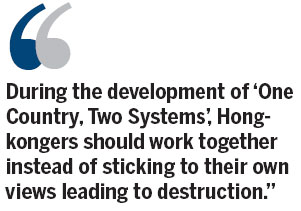Who will assume the guilt?
Updated: 2013-09-04 06:44
By Ho Hon-kuen(HK Edition)
|
|||||||
The term "Occupy Central" has been interpreted by some locals and people around the world as a tactic of civil disobedience by people who desire universal suffrage in Hong Kong and a call for civilians to occupy Central to compel the HKSAR government and the central government to launch early public consultation on universal suffrage so that the election of the Chief Executive could be implemented without a screening of candidates. A "good show" has been put on in Hong Kong.
Recently, Zhang Xiaoming, director of the Central People's Government's Liaison Office in the HKSAR, was invited to attend the luncheon of the Legislative Council for the first time and made a speech. Educationally speaking, Zhang's speech shed light on three highlights: first, the inclusion of the screening mechanism for candidates in universal suffrage doesn't do any harm; second, the "Occupy" movement is an illegal act and a scourge; third, the movement has a negative impact on the young generation.
When it comes to the movement's effect on teenagers, it is always associated with education. Having a strong political stance, the teachers' union has seldom been involved in the development of teachers' resources. However, after "Occupy" hit the headlines, the union rushed to design related teaching materials. Whether the content was impartial or not can easily be assessed by users, if any, from an educational point of view.
Before the SAR government's consultation on universal suffrage of the Chief Executive, there had already been heated discussion of "Occupy" and those advocates portrayed as heroes of universal suffrage. "Occupation" is not only combative language, but also an "illegal move" and an offence with evident provocative intent to the SAR government and the central government.

If those "democracy" fighters come to power with the familiar mantra, "no fear to sacrifice and against all odds to fight for victory", will it be conducive to the implementation of the "One Country, Two Systems" principle, or the introduction of universal suffrage of the Chief Executive as stated in the Basic Law? If we face up to history, we understand that the fight for universal suffrage in Hong Kong never occurred during British colonial rule.
From the perspective of education, the administrative sovereignty of "One Country" has to be respected. Under the "Two Systems", Hong Kong is bound to implement universal suffrage. Whether it can be introduced appropriately depends on the mutual respect and understanding of the historical development and its meaning. This can be a breakthrough in Hong Kong's current stalemate. Between 1979 and 1982, the central government went through careful investigation and discussions before making the decision to resume the sovereignty over Hong Kong in 1997, followed by the more important move to put the "One Country, Two Systems" principle into practice so as to be conducive to both the mainland and Hong Kong.
There are several implications of the "One Country, Two Systems" principle: first, the maintenance of a country's unification, which is also the core of "Two Systems"; second, not only to a win-win proposal for unity, but also a new global view for China to advance internationally. That means a uniform China can accommodate two different social systems and ideologies; third, "Hong Kong people governing Hong Kong" and a "high degree of autonomy" are obligations; fourth, "peaceful unification" and "peaceful coexistence"; fifth, if China succeeds in promoting "One Country, Two Systems", the principle of "one world, two or more systems" created by China can emerge in the international arena.
Based on the aforementioned meaning of "One Country, Two Systems" with rational deliberation, Hong Kong will remain unchanged for 50 years after the handover. In 2046, unless the entire world only accepted "one world, one system", the principle of "One Country, Two Systems" could be sustained and continue.
It is difficult to break the present from the past and the future. During the development of "One Country, Two Systems", Hongkongers should work together instead of sticking to their own views leading to destruction. Whether the discourse and action of "Occupy" is considered a subversion of the values of "One Country, Two Systems" or a respect for the core values that are created by a new world view, history will tell.
Under the "Two Systems", whether universal suffrage is well-received or not, the mainstream media has been singing its praises, but the principle of "One Country" which nurtures Hong Kong with values and virtues is seldom mentioned or even evaded with disdainful talk. In short, some think it would be great if one wasn't born Chinese in the next life.
What will happen if such a situation goes on? Singapore's founding father once said, "Singapore is not afraid of competing with Hong Kong, but only scared of the mainland's support behind Hong Kong." Russia's President Vladimir Putin once said, "The main reason why the Russian economic reform falls short of China's is that behind her there is the experience of Hong Kong." These historical speeches still retain their significance today.
Finally, those who ignore the "One Country, Two Systems" principle in Hong Kong are those who will assume the historical guilt".
The author is the vice-chairman of Education Convergence.
(HK Edition 09/04/2013 page9)